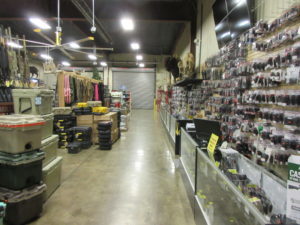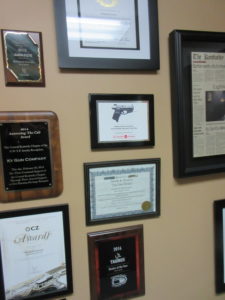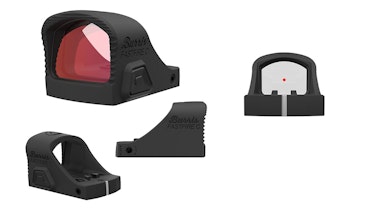Each of these customers could possibly provide an idea that leads to more profits and customers. Listen up when they speak. (Photo: Michael Faw)
Unfortunately, retail establishments everywhere seem to have lost the ability to complete one key element when making, or attempting to make, any sale — listening to the customer.
In the perfect business environment, all any store employee needs to do is let customers speak all the details on what to stock, when to stock it and possibly how to display those items. Listening to customers in the aisle, beside in-store displays and again at the cash register, can help to better serve them while also helping any retail store become more profitable. It pays to listen.
Actively Listen
Listening and hearing what a customer says is not something that just happens. Listening is an activity that requires a conscious effort to hear the key words and phrases, stay focused on the message(s) and pay attention to what the other person actually says. Messages are provided by them in their words—and in their body language. A frown says they are unhappy, or if they cross both arms over their chest, they have normally closed your message out from what they wish to hear.
Active listening requires patience—and pauses—to keep a customer talking and explaining. To keep the communication flowing, smile often, keep direct eye contact, and don’t look at the clock on the wall or your wrist watch. It’s also very easy to engage with one of the most annoying things we all encounter these days in customer service situations, so don’t pull your phone out and start texting or checking e-mails while the customer is talking. This a sure sign you are NOT listening.
Why listen to customers? It’s important to remember the old statement that continues to hold true today—Customers are King. It’s a fact in retail environments that customers cause cash registers to ring. Customers are the key to sales that keep a business open and dollars coming in. It’s also very important to coach all store staff to listen to customers.
Sometimes customers need a little prodding to reveal what they are thinking—or what they really mean to reveal. You and all in-store staff may need to set the proper groundwork to get customers to speak up. Key steps are to ask questions, point to examples and displays, and if a customer mentions something they saw in your range or store, try going to that site with them and ask for more details. This is critical if the display did not result in a sale. Let your customer possibly tell you why.
"Listening to the customers is extremely important,” says Patrick Hayden, owner of Kentucky Gun Company in Bardstown, Kentucky. “You can easily identify the core products you should carry and any new products that has the customers’ interest just by listening to them. And this doesn't always have to be done over the gun counter, we will occasionally post a new item on our Facebook page and ask our followers, ‘Would this be an item you are interested in?’"
Everyone likes to be an expert and give opinions, but to effectively listen, simply keep quiet. Pause, and pause often, to encourage the customer to keep talking. That gives them more time to think, organize their thoughts and views and make important comments. What a customer says can give you an overview of your store, the competition, insight into the habits of other shoppers in their category and many other important things businesses should know about their customer base or items offered for sale. Listen intently for key points that customers want you to know.
When something a customer says sounds confusing, be certain to ask questions for clarity. A talking customer, especially one who is an active shooter, new shooter, possibly a new 3-gun competitor or simply a shopper, will be glad to tell about their buying habits. Key words and phrases to listen for are: “I own___; I am looking for___; My friend bought___; I would love to shoot ___ or compete in___.” More comments to key in on are statements about ammunition, firearms, accessories or other items that are specifically named.
Have doubts or want to let the customer know you have been listening? Simply rephrase the key words and repeat what they say. This can be critical if you wish to confirm a statement and solicit more details.

Customers can provide valuable feedback on your goods, how they are displayed and about what could be missing. Try to engage customers at many locations at a store or range, and not just at the cash register.
Customers Comments Can Mean Profits
If you listen closely, customers can give great business ideas.
At Kentucky Gun Company, customers kept asking about ATVs and ATV accessories, so Hayden explored his options and made space for an ATV showroom and an on-site ATV and motorcycle service center. Numerous customers next said they would buy an ATV if they only had a way to move or transport it. Hayden again listened and now stocks a line of trailers for towing and hauling ATVs. Those are prominently parked outside his business for all to see. All of this listening to customers means more sales along with more customers coming to the shop for more reasons, and more profits.
Wondering why customers think or do things that seem odd? Listen closely and they may tell you. Customers have ways of hinting about what they like, or dislike, about your range or store and the items and services offered there.

These numerous awards are proof that the owner and staff at Kentucky Gun Company have been listening to customers.
Comments about excessive range noise, something out of reach on a top shelf, noting if the person had to hunt for an item or did not know you stocked an item, may lead to clues for future changes in displays. Not just in displays, but store shelving rows, product sections, the entrance to a range, or such critical things such as signage directing to a restroom can all be improved if you listen to comments from customers. They tell you how to market to them. Listen up.
Customer comments can also help your range or store pull customers away from the competition or reach a new customer base. If a customer makes a comment about something that happened, or that they saw or heard while in a competitor’s store or range, listen up again.
Customers can provide key insight into your competitors, or other stores or ranges, that they have visited. You could also learn about new items the competition may be getting in soon, something on sale or close-out at other locations, and other key marketing and sales details. This information—provided by a customer — can help you make key business decisions and possibly avoid problems your competitors are having because they stocked—or failed to stock—items or products or offer key services. Let your customers scout—and listen closely when they report back to you.
One phrase should help you make future plans: “I am looking for ___.” If you don’t have something and a customer asks for it, or several customers have asked for the item or sizes, or colors, etc., you should do some quick research and make profit calculations.
This is especially true with new firearms and equipment released to the market. What are your customers seeking that you do not stock, how soon can you get it, where could you place the item(s) and what profit margin could you expect to recover? Customers may answer the question of where to place the item in your store or range for you.
Listen Up For Critical Clues
Another reason to listen to customers are for the key details. After a customer leaves, and before you forget, take a moment to take notes. It’s a good idea to write down customer names (if known), notes about goods or services they discussed, and any numbers they revealed.
If you bring in an item because of this customer insight, you could possibly call the customer to let them know the item is in stock, or call it to their attention the next time they are at your range or shopping in your business.
Listening requires training, but the rewards are many. Customers who feel listened to will be repeat customers if all else was positive during their visit.
One final note on active listening. There are numerous sources for online courses or quick exercises on active listening that you and all store staff can complete. Several are free-of-charge. The more you know, the better you will be able to hear what customers are telling you.
Listen up!







